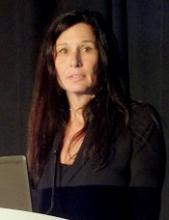SAN DIEGO—A three-drug combination produced “deep and durable” responses in patients with relapsed/refractory multiple myeloma (MM), according to a speaker at the 2018 ASH Annual Meeting.
Selinexor, dexamethasone, and daratumumab produced a response rate of 73% when given at the recommended dosing schedule to MM patients who had received at least three prior lines of therapy, including a proteasome inhibitor and an immunomodulatory agent.
Most responders had a very good partial response (VGPR), but there were no complete responses. At a median follow-up of 7.7 months, the median progression-free survival had not been reached.
The most common grade 3/4 adverse events (AEs) in this trial were hematologic toxicities.
Cristina J. Gasparetto, MD, of Duke University Medical Center in Durham, North Carolina, presented these results, from the phase 1/2 STOMP trial (NCT02343042), as abstract 599.*
Patients
As of November 15, the trial had enrolled 28 MM patients. At baseline, their median age was 68 (range, 44-77). There were 14 males and 14 females. The median time from diagnosis to study treatment was 5.9 years (range, <1 to 12.9 years).
Patients had received a median of 3 (range, 2 to 10) prior treatment regimens.
All 28 patients had received a proteasome inhibitor, and 61% of them (n=17) were refractory to the treatment. All 28 patients had also received an immunomodulatory drug, and 64% of them (n=18) were refractory to it.
Seventy-nine percent (n=22) of patients had undergone an autologous transplant, and 7% (n=2) had received prior daratumumab.
Treatment
Patients were treated in two concurrent cohorts.
One cohort included 25 patients who received selinexor at 100 mg once-weekly (QW), dexamethasone at 40 mg QW, and daratumumab at 16 mg/kg QW.
The other cohort included three patients who received selinexor at 60 mg twice-weekly (BIW), dexamethasone at 20 mg BIW, and daratumumab at 16 mg/kg QW.
The recommended phase 2 dose and schedule was selinexor at 100 mg QW, dexamethasone at 40 mg QW, and daratumumab at 16 mg/kg QW.
Safety
Among patients who received the recommended phase 2 dosing schedule, common treatment-related AEs included:
- Nausea (60%)
- Diarrhea (32%)
- Anorexia (28%)
- Vomiting (24%)
- Dysgeusia (20%)
- Fatigue (48%)
- Hyponatremia (28%)
- Insomnia (24%)
- Blurred vision (24%)
- Thrombocytopenia (64%)
- Anemia (48%)
- Leukopenia (44%)
- Neutropenia (44%)
- Lymphopenia (20%).
“[T]he weekly dose was better tolerated [with] only a couple of patients with grade 3 [gastrointestinal] toxicity,” Dr Gasparetto noted.
The most common grade 3/4 AEs were thrombocytopenia (44%), anemia (28%), leukopenia (28%), and neutropenia (24%). There were no grade 5 AEs.
Efficacy
The median follow-up was 7.7 months, and the median time on study was 5.8 months.
Twenty-six patients were evaluable for response, as two patients withdrew consent prior to follow-up.
The overall response rate was 73% (n=19), which includes seven very good partial responses (VGPRs) and 12 partial responses (PRs). Two patients had a minimal response, four had stable disease, and one progressed.
Among patients with a PR or better, the median time on treatment was 7.3 months. The median time to response was 1 month.
Three VGPRs are ongoing, but four patients who achieved a VGPR progressed.
Six PRs are ongoing, and one patient with a PR progressed. Other reasons for treatment discontinuation among patients with a PR included transplant (n=1), AE (n=1), patient decision (n=2), and hospice (n=1).
One patient with a minimal response progressed, and one discontinued treatment due to an AE.
The median progression-free survival was not reached.
“Selinexor in combination with dara and dexa appears to be highly active, producing deep and durable responses in the relapsed setting,” Dr. Gasparetto said.
She reported relationships with Takeda, Janssen, Celgene, and Bristol-Myers Squibb. The trial is sponsored by Karyopharm Therapeutics.
*Data in the presentation differ from the abstract.


